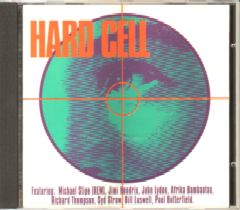 Title:
Hard Cell
Title:
Hard Cell
Format: 1CD
Company: Mau Mau Records
Ordering Number: MAUCD 622
Matrix Number: MAUCD 622 MPO 01 @
Country: France
Year: 1992 (?)
 Title:
Hard Cell
Title:
Hard Cell
 Title:
Hard Cell
Title:
Hard Cell
Format: 1CD
Company: Mau Mau Records
Ordering Number: MAUCD 622
Matrix Number: MAUCD 622 MPO 01 @
Country: France
Year: 1992 (?)
In every time there is a small, select number of great record labels, poised at the cutting edge of contemporary music, anticipating new directions so adroitly that they also serve to shape them. In the 50s it was Prestige and Riverside, in the 60s Blue Note and Impulse, in the 70s ECM and Black Saint. Celluloid aspired to be the leading contender to win that title for the 80s.Run by Bill Laswell, Roger Trilling and Jean Karakos, Celluloid wanted to be both a barometer and an instrument of change. Specifically, this change was in the climate of music in the 80s a climate which acknowledged the technological, historical and geographical differences between that decade and the one before. According to Roger Trilling, this change in climate could be ascribed to five different factors:
Bearing this in mind it makes sense to view Celluloid as separate and distinct from jazz, electronic, ethnic or archival catalogues. Their releases, in one way or another, relate to the mainstream of pop music.
- The total dissolution of Be-Bop or any other unified style in Jazz.
- The unfollowable nature of free jazz, which meant that there was no longer a schooling ground for young musicians in any particular idiom.
- The universal experience of rock and r&b among young musicians.
- The international nature of musical sources in the 80s. Enterprising young musicians had available to them a much greater variety of musical experience both in terms of playing and listening. African, Cuban, Brazilian, and Asian musics became part of everyone's vocabulary.
- The greater importance and accessibility of electronics in music making.